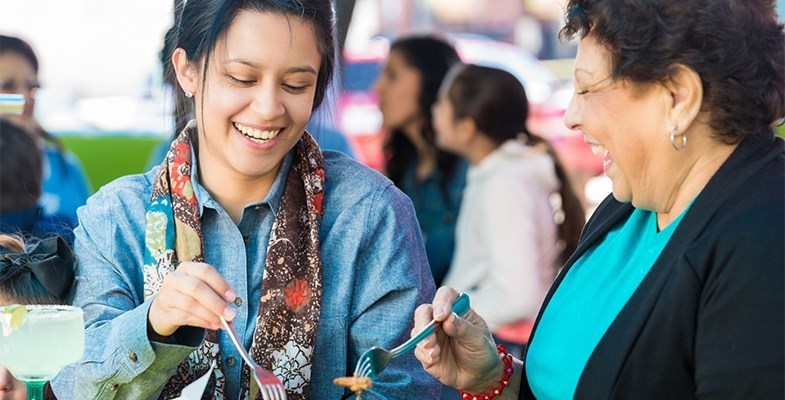Connecting to the community is one of the keys to living a healthy, vibrant life. Getting out and enjoying time with friends and family doesn’t just make life more interesting – it makes life healthier and more satisfying.
Studies have shown that friends, activities and social interaction are important to health and emotional well-being, especially for older adults. One study in the Journal of the International Neuropsychological Society found that people who had regular social contact reduced their rate of mental decline by 70 percent compared with the ones without much social activity. Older adults with more social connections seemed to more fully maintain their independence in better health.

Michelle Wyman, dementia specialist at the Hartford HealthCare Center for Healthy Aging reinforces these points, putting socialization in perspective, “Graceful aging means finding a balance between acceptance of the changes of aging and doing what we can to remain vital and healthy as long as possible.” Social connections become companions on the journey of everyday life.
6 health benefits of being social:
Michelle Wyman, LSW, CDP and Alzheimer’s/dementia specialist at Hartford HealthCare Center for Healthy Aging conducts classes on “Coping with Changes and Benefits of Being Social for Brain Health as We Age” as part of a “Healthy Minds” series. She points to these health benefits.
Being social:
1. Adds years to your life
2. Reduces the risk of stroke
3. Boosts your immune system
4. Encourages good habits
5. Lowers/delays risks of getting Alzheimer’s disease
6. Relieves pain
Socializing for life
Retired publicist Ruby Ryles-Martin has seen the power of social connections from multiple perspectives, as a member of the Newtown Commission on Aging, as an administrator of senior programs of Danbury’s New Hope Baptist Church, as a remote caregiver for elderly family members and as a member of the Danbury Age Well Community Council, dedicated to creating a community where people can age in meaningful, healthy ways.
Ryles-Martin explains, “Most people need help with navigating the dynamics of longevity. There’s no instruction manual for aging. It all starts with your attitude, seeing longer lives as a gift of time.” Buying into the value of socialization is a critical step in making the most of a long life. “Having an appreciation for the role of a social life as part of health, both mental and physical, sets us up for a healthier and more satisfying time ahead.”
Age Well CT: Helping western CT connect to well-being
One of the Age Well Community Council initiatives is Age Well CT (agewellct.org), connecting older adults with activities and work.
“People need companionship and support,” Ryles-Martin notes. “Socialization is a critical component not only of healthy aging but also aging productively. When you combine socialization with exercise, you have the ingredients for well-being throughout life. Age Well CT is committed to helping older adults find resources for healthy living and stay connected to the community.”
Many find making friends and becoming part of a community anything but simple. However, there are some steps people can take to make connections.
Step one: Connect with the community
Joining group activities, paid employment and volunteering are great ways to build and maintain social connections over longer lifespans:
- Use skills and lifetime experience to help by teaching a class , lead a discussion of your choosing
- Volunteer for something you care about
- Sign up for Friendly Visitors, volunteers who visit neighbors and provide companionship
- Visit the senior center – have lunch, do exercise, go on a trip
- Join in – find something interesting, Silver Sneakers, a book club
Step two: Take a class
Learning is a good way to socialize and get to know people. Senior centers, parks and recreation departments – even health centers in Connecticut offer everything from tai chi to nights at the theater to French lessons. The hardest part of getting started will be choosing which classes to join.

The Aging Mastery Program® (AMP) is intended to help people “embrace the gifts of longevity” and build their own playbook for aging well. So far, the program is being offered at a few locations in Connecticut, with plans for more. Go to CT Healthy Living Collective’s website for a class near you.
During the 10-week course, participants have the opportunity to interact as they learn skills that no one ever teaches you in school. Community engagement is a big part of the program. This class helps participants identify opportunities to leverage their vast skills and life experience while they make deeper connections in the community.
Step Three: Learn how to do more with technology
Older adults are increasingly using computers. Ryles-Martin recommends taking a computer course as a way to meet others and to access more opportunities to join community activities. “Information is power,” Ryles-Martin says. “Access to the internet helps people open up to what is out there, from local websites like AgeWellCT.org and state resources like MyPlaceCT.org.”
Get started now – join in
The benefits of socializing go far beyond having friends to talk to. Social connections are essential for health and well-being. For people in Connecticut, there have never been more opportunities to stay connected through life.
Maybe the poet William Butler Yeats said it best, “There are no strangers here; only friends you haven’t yet met.”
For more ideas and information on community engagement, check out the social engagement page on MyPlaceCT.org.
Add to Favorites
